Matt Rees's Blog, page 19
March 24, 2011
Ridiculous publicity ideas for authors
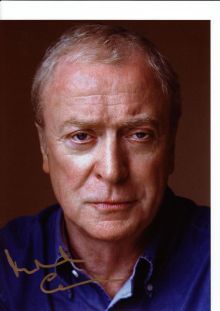 In less than two months, my next novel MOZART’S LAST ARIA will be published in the UK (the US publication date is November). This means I have to start thinking about publicity.
In less than two months, my next novel MOZART’S LAST ARIA will be published in the UK (the US publication date is November). This means I have to start thinking about publicity.Naturally I’ll be doing the usual kinds of things that writers do these days. The promo video is already made and can be seen on www.mattrees.net. It will be particular hit with you if you want to see me wearing a powdered wig and silk stockings; it also features my adorable three-year-old son dressed as Little Mozart. One for the ladies, I’d say.
I shall be Facebooking, guest blogging, even tweeting perhaps, and sending emails to everyone who ever wrote an email to me. But all writers do that stuff.
So I shall also be adding some truly ridiculous publicity stunts to my “online presence.” Given that some of the other things necessary for publicity are a bit of a drag, my only criteria for my ridiculous stunts is that they ought to be fun.
For example, stay tuned for readings from MOZART’S LAST ARIA and some of my previous novels by major celebrities such as Michael Caine, Richard Burton, and Sean Connery.
Good publicity, eh? But surely expensive, you say.
Not if you work on your impersonations.
Read the rest of this post on my blog The Man of Twists and Turns.
Published on March 24, 2011 01:13
•
Tags:
blogs, crime-fiction, dame-edna-everage, michael-caine, mozart-s-last-aria, publicity, richard-burton, sean-connery, winston-churchill, yasser-arafat
March 17, 2011
My burst Jerusalem bubble
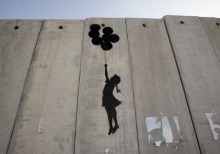 My taxi pulled up at the traffic lights on the way into Jerusalem late Sunday night. A half dozen Breslav hassids were bouncing up and down in front of the traffic, waving signs and grinning with the exultation of wedding party dancers. They were singing, “Death to the Arabs.”
My taxi pulled up at the traffic lights on the way into Jerusalem late Sunday night. A half dozen Breslav hassids were bouncing up and down in front of the traffic, waving signs and grinning with the exultation of wedding party dancers. They were singing, “Death to the Arabs.”Welcome home, I thought. Something dark descended on me. I’d been away for a week attending a literature festival in Dubai. I’d become close – quickly, as can often happen at a conference which keeps you within the confines of a hotel for many days – with a number of exiled Palestinian writers who initially wanted to chat with me about my Palestinian crime novels. As the car beside my taxi honked its horn in time to the murderous chant, I thought of those writers, those beautiful, intelligent souls, and soon enough I found a way out of the darkness.
I’ve made a bubble for myself in Jerusalem. I’m neither Israeli nor Palestinian. I admit that I don’t really participate in either culture. I’ve enjoyed that detachment, because it leaves me to focus on my writing, free of distractions such as caring what the hell happens around me.
In this case, the bubble burst. I had to decide what I would let in through those fractured defenses. Would it be negativity, anger at the jumping scum at the traffic lights whose idea of a response to the slaying of an Israeli family in a settlement near Nablus two nights before was to call for more blood? No, I knew I could fill the space with the books of the Palestinian writers I had met while I was in Dubai.
For the rest of this post read my blog The Man of Twists and Turns.
The sensitive creativity of Susan Abulhawa, whose “Mornings in Jenin” is as powerful a rendering of the disasters of recent Palestinian history as has ever been written, with a universal, human quality of great rarity. The poetry of Nathalie Handal, politically committed and yet mystical. Or Raba’i al-Madhoun, who wrote “The Lady from Tel Aviv,” engaging with Israel and what it has meant in his life, rather than wishing for death to its people.
Thanks to them, I’ve never felt more strongly that literature is the power in my life. Because its subtlety overwhelms the ugly, one-way thinking of politics.
Graham Greene wrote that “when you’ve lived in a place for a while, you cease to read about it” (“The Quiet American”.) That had happened to me, too, here in Jerusalem. It’s been a while since I read much Palestinian or Israeli literature. I think that was a mistake. It meant that my perception of the people who lived around me was too much colored by the stupid politics, by the bouncing fools who want the other guys to die so they can do as they wish.
That won’t happen again.
Published on March 17, 2011 04:59
•
Tags:
arabs, graham-greene, israel, israelis, jerusalem-dubai, jews, literature-festival, nathalie-handal, palestine, palestinians, raba-i-al-madhoun, susan-abulhawa
March 3, 2011
Corrupt LSE finds out what happens when you lack lit dept
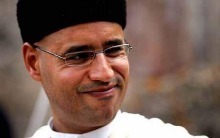 Potential students of the London School of Economics ought perhaps to rethink their choice of university, particularly if they plan to study international relations. After all, Muammar Qaddafi had to kill thousands of his own people before the LSE’s distinguished academics realized he might be something of a dictator.
Potential students of the London School of Economics ought perhaps to rethink their choice of university, particularly if they plan to study international relations. After all, Muammar Qaddafi had to kill thousands of his own people before the LSE’s distinguished academics realized he might be something of a dictator.However, if your plan is to study how to be a hypocritical, corrupt bastard, then the LSE is for you. There’s money in it, you see.
The LSE, which claims to educate many of tomorrow’s leaders, agreed to take $2.4 million from Qaddafi’s son, Seif el-Islam. For its Global Governance program, of all things. By the time the current murderous civil war engulfed Libya, the LSE had received 300,000 pounds. It now says it’ll divert that donation, presumably to a charity.
Meanwhile, Seif el-Islam Qaddafi received a PhD from the LSE. An inquest may be undertaken, it seems, into accusations of plagiarism by “Dr. Qaddafi.”
I’d have little to say about all this if the LSE had come out and said, “Look, we’ve had government cutbacks. We needed the money. We decided, let’s sell a doctorate to the son of the Libyan flake and use the cash for educating others who’ll go on to great careers like other LSE alumni such as Mick Jagger and Sir Veeraswamy Ringadoo, the first president of Mauritius.”
Like Tennesse Williams, I try to look mildly on the peccadilloes of human beings. And like Ernest Hemingway I believe one should take the money and run.
Hypocrisy and self-righteousness, however, disturb my calm, to put it mildly. Particularly when it’s the hypocrisy and self-righteousness of well-heeled academics who think they can get away with allowing someone else to get away with murder so long as nobody notices.
Read the rest of this post on my blog The Man of Twists and Turns.
Published on March 03, 2011 00:00
•
Tags:
arab-world, libya, london-school-of-economics, mick-jagger, middle-east, qaddafi, seif-el-islam-qaddafi
February 24, 2011
For Arabs: democracy, then crime fiction
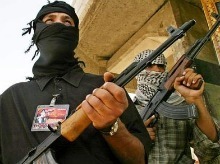 Crime fiction may not be the first thing on the minds of the protesters taking to the streets for democracy across the Arab world. But one of the offshoots of the downfall of Arab dictators is sure to be an explosion of thrillers and mysteries.
Crime fiction may not be the first thing on the minds of the protesters taking to the streets for democracy across the Arab world. But one of the offshoots of the downfall of Arab dictators is sure to be an explosion of thrillers and mysteries.Until now there has been almost no crime fiction written in Arabic. A couple of little-known writers in Egypt and Morocco have contributed old-fashioned Agatha Christie-style cosies (“One of the people at this oasis is the killer.”) The best Arab detective writer has been Yasmina Khadra, whose series about Inspector Llob is supremely gory and noirish. But Khadra writes in French from exile in France.
I believe Arabs have eschewed crime writing because it’s a democratic genre. One man wants to find out something that a big organization – the CIA, the mafia, the government – wants to keep secret. It’s easy to see why Hosni Mubarak probably wasn’t a fan of Raymond Chandler.
For people who live in democracies, it’s easy to find fiction credible that suggests a man can investigate – and once he fingers the bad guy, the bad guy will be punished. That’s why Scandinavian crime fiction by Henning Mankell et al is so popular: the Nordic societies have us all convinced that an eruption of violence, crime or murder, will soon enough be resolved and life can go back to its usual extreme orderliness.
Not so for the Arab world. Arabs have a deep sense of fatalism. Not only do they lack faith that the bad guy will be punished, they’re quite sure the bad guy will prosper. He’ll drive his Mercedes to his villa directly from the government offices or state-run companies where he rakes off his big take. The ordinary guy will be left to live on $2 a day.
When I came to write my series of Palestinian crime novels, one of the challenges was to make the format of the crime novel work in an environment where law and order didn’t really function or protect ordinary citizens. I did it by demonstrating that while my sleuth, Omar Yussef, might nail one bad guy at the end of the book, he would be left with an awareness that there were many other guilty men who had escaped him. As one German reader put it to me at a book festival, “I like your books because, in the end, everyone’s guilty.” The reason people across the Arab world are rising up is because they don’t want to share the guilt and shame of their broken, repressed societies any more.
Read the rest of this post on my blog The Man of Twists and Turns.
These observations are true even for countries where there isn’t what we’d call a Western-style democracy – which I’d characterize as a democracy where corruption is either extremely well-hidden or disguised as a stock market in which all can supposedly participate. Take Russia, for example. Clearly not the democracy its people might dream of. But nonetheless one in which opposition journalists – at considerable risk to themselves – do function in the face of the state apparatus and its corrupt overlords.
In South Africa, there was almost no local crime fiction under apartheid. When that changed, there was an explosion of crime writing.
The situation in the Arab world is changing now. Which shows that there’s a thirst for democracy, for accountability – and, therefore, for crime fiction.
Published on February 24, 2011 00:55
•
Tags:
agatha-christie, arabs, crime-fiction, democracy, henning-mankell, hosni-mubarak, middle-east, omar-yussef, raymond-chandler, writing, yasmina-khadra
February 2, 2011
Omar Yussef predicted Cairo and Tunis
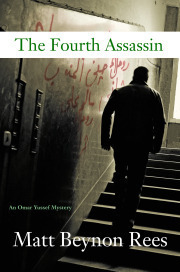 If you’ve been wondering why the people of Tunisia and Egypt have risen up against their dictators and why it caught Washington with pants down, it’s because you didn’t read THE FOURTH ASSASSIN, the latest of my Palestinian crime novels.
If you’ve been wondering why the people of Tunisia and Egypt have risen up against their dictators and why it caught Washington with pants down, it’s because you didn’t read THE FOURTH ASSASSIN, the latest of my Palestinian crime novels.In THE FOURTH ASSASSIN, which was published exactly a year ago, my Palestinian sleuth Omar Yussef travels to New York for a conference at the UN. While there, he uncovers an assassination plot. But he also has to address the conference about the life of ordinary Palestinians —— and the people of other Arab countries.
Here’s a passage from that chapter of the book, with Omar addressing the delegates from Arab countries and the Americans:
“ ‘It may be hard for you to understand, but what ordinary Palestinians want and what they battle for every day is precisely what’s denied to most of your citizens in the Arab countries: freedom and economic prosperity.’
The Libyan delegate removed his finger from his nose and flicked it angrily. The Syrian strode down from the rear of the hall, dropping his
cigarette. The Lebanese stepped out the butt on the carpet as he followed.
‘How can you, the Arab countries, dictate a solution for the Palestinians, when you suffer from many of the same problems? In fact, you, the governing class, thrive on the lack of democracy, the inequality of wealth. Take away the Israeli occupation and the Palestinians would be closer to freedom and a functioning economy than most of your peoples.’
Read the rest of this post on my blog The Man of Twists and Turns.
Published on February 02, 2011 01:00
•
Tags:
bashar-assad, brooklyn, cairo, crime-fiction, egypt, middle-east, new-york, omar-yussef, politics, syria, the-fourth-assassin, tunis, united-nations, washington
January 27, 2011
Enter character the Black Swan and Bruce Springsteen way
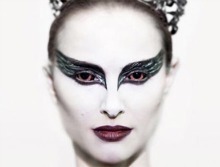 A writer needs to enter the characters in his novel. I’ve talked about this with other writers, but also found it useful to discuss it with artists from other fields. Two movies I saw in the last week, “Black Swan” and “The Promise: The Making of Darkness on the Edge of Town,” illustrate just why it’s so important.
A writer needs to enter the characters in his novel. I’ve talked about this with other writers, but also found it useful to discuss it with artists from other fields. Two movies I saw in the last week, “Black Swan” and “The Promise: The Making of Darkness on the Edge of Town,” illustrate just why it’s so important.“Black Swan” revolves around the dilemma facing Natalie Portman as a ballerina cast as both the White Swan and the Black Swan in “Swan Lake.” The White Swan is no problem for her – she’s virginal and precise. But the seductive Black Swan is beyond her – she can’t loosen up and seems to be going crazy in her subconscious determination not to do so. Her director tries to drive her beyond the mere dance steps necessary for the role. The cliché would be to say he wants her to inhabit the role. But actually he wants the role to inhabit her.
That’s what makes the movie so compelling to watch as an artist. Because that’s the way it has to be. A writer has to be invaded and driven by his character. The other way around is too shallow, too distanced.
For a dancer like Portman’s character, there’s only one way to make the movements of your body convey emotion, and that’s to experience the emotion. To dance the Black Swan, you have to be able to step forward and say, “I’m the bloody Black Swan, dammit,” and for it to be true.
It’s the same for a writer. In the moment of writing about a particular character, all the writer’s reactions must come directly from the connection between the writer and the emotion at the heart of what he’s writing. If I ever experience a weak connection or a break, I can tell immediately: the words don’t come; or the most obvious character reaction suggests itself and instantly feels false.
I’ve developed techniques for entering into the character. They involve meditation and “breathing” through the heart, rather than the head. It opens you directly to the necessary emotion.
Read the rest of this post on my blog The Man of Twists and Turns.
Published on January 27, 2011 01:17
•
Tags:
adam-raised-a-cain, ballet, black-swan, bruce-springsteen, character, mozart, mozart-s-last-aria, natalie-portman, swan-lake, white-swan, writing
January 13, 2011
Bestselling teeth for Writers
 A few years ago, I was at dinner with an American couple who were friends of mine. I had known them a while, but there was something odd about them that night. When they spoke, I was slightly dazzled. I paid more attention to his jokes, even though I had heard most of them before. She was suddenly very attractive.
A few years ago, I was at dinner with an American couple who were friends of mine. I had known them a while, but there was something odd about them that night. When they spoke, I was slightly dazzled. I paid more attention to his jokes, even though I had heard most of them before. She was suddenly very attractive.I couldn’t work out what it was that had transformed them. Then I saw it. “Your teeth are very white,” I said.
“Crest White Strips,” they both responded, winningly candid as people from Ohio often are. I was sure I had been looking at her breasts, but in fact it had been her dentistry.
I had a book tour coming up, some visits to France and Germany and the UK. I’m a pretty confident fellow, but, I reasoned, every little helps when an author ventures out of his usual environment (a single room where he spends his days alone, his features sagging through a lack of the necessity to give other people facial cues) and into the world of public speaking and grinning. So I slapped Crest’s strips of gel encased in thin plastic over my espresso-mellowed averagely yellowish teeth, having first been assured by my dental hygienist that “it won’t make them fall out, if that’s what you’re worried about.”
Naturally I charmed everyone I came into contact with on that trip, even my mother. Of course I can’t say no one noticed. My French publicist asked me if my teeth had been “blanchissées,” shortly after she warned me not to seduce her intern, whom she had temptingly described as “beautiful and stupid.” I denied any interest in either teeth-whitening or gorgeously vapid French students, even going so far as to point out that I had already engaged in congress with a beautiful, stupid French woman when I lived in New York and wasn’t game for a repeat performance. She puffed on her cigarette and puffed out her cheeks with a lift of the eyebrows, a Parisienne gesture which means “It’s neither here nor there to me, but you’re full of it, mon ami.”
Blanchissées, I suppose I added a tiny element of swagger to my person at a time when one or two other elements of my life were equally tinily deswaggering me. I didn’t seek those elements out, so I see no reason not to have counterbalanced them with a technique which ordinarily would never have appealed to me.
This winter and spring I have some similar book tour events coming up. But I’ve discovered that none of the pharmacies in Jerusalem where I used to buy my White Strips stocks them any more. No one will tell me where I can get them (the pharmacists, being from the Middle East, substitute a brief closing of their eyes and a dismissive click of their tongue for the sentence “Sorry, sir, but I’m afraid I can’t help you.”)
Read the rest of this post on my blog The Man of Twists and Turns.
Published on January 13, 2011 06:34
•
Tags:
book-tours, crest-white-strips, crime-fiction, manchester-united, middle-east, teeth, white-teeth, zadie-smith
January 1, 2011
Israel's president is no angel
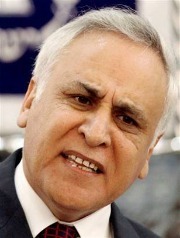 When the residents of Kiryat Malakhi, the southern Israeli town whose name means “City of Angels,” picked Moshe Katsav as the youngest-ever mayor in the country’s history in 1970, he was 24. For decades he was the town’s symbol, an immigrant born in Iran who made it to the top of the establishment and was elected Israel's president in 2000.
When the residents of Kiryat Malakhi, the southern Israeli town whose name means “City of Angels,” picked Moshe Katsav as the youngest-ever mayor in the country’s history in 1970, he was 24. For decades he was the town’s symbol, an immigrant born in Iran who made it to the top of the establishment and was elected Israel's president in 2000.Now it has been proven that they picked the wrong man.
Far from being an angel, Katsav stands convicted of two counts of rape and of other counts of sexual harassment and obstruction of justice. Tel Aviv District Court judges said Thursday that Katsav had “excelled in manipulation and withholding information” during his trial.
Katsav was found guilty of twice raping a woman who worked for him when he was tourism minister a decade and a half ago. He was also convicted of sexually abusing and harassing two women who worked for him at the president’s residence.
Beyond the ugliness of his crimes, the hubris of Katsav’s case is immense. It was Katsav who first drew public attention to his sexual misdeeds — to which other politicians had long turned a blind eye — by complaining five years ago to the attorney general that he was being blackmailed by one of the women he now turns out to have abused.
Subsequently, he was offered a controversially lenient plea bargain, according to which he would have escaped prison and accepted conviction on lesser charges than rape. Just as the deal was due to be signed, Katsav rejected it, claiming he would prove his innocence in court. It now appears he had been seduced by his own lies.
When the accusations were first leveled at him, Katsav ranted at length against the media in a rage-filled press conference at the presidential residence. He railed that he was the “victim of a lynching” by the media and the judiciary, because he was an upstart from a poor town whose origins lay in the Muslim world, not among the typical Israeli elite descended from European Jews. This was in spite of the fact that the attorney general who indicted Katsav was born in Tunisia.
The Tel Aviv judges noted the 65-year-old former president’s tactical error, when they highlighted the new evidence that had arisen since the rejection of the plea bargain — evidence which made his conviction all the more certain. Had Katsav accepted the plea deal, he would by now have been a candidate for prime minister. Instead, he could face up to 16 years in jail.
Katsav’s lawyers say he’ll appeal and, in the manner of the long court case so far, unnamed friends have appeared in the Israeli press to say how depressed he is that the court didn’t accept his explanation of events. Some described him as too upset to leave his house for his local synagogue on Friday.
Outside the court, where his father had been required to surrender his passport, Katsav’s son Boaz rejected the verdict: “We will continue to walk with our heads high, so all the nation throughout its generations, with God’s help, will know that father, the eighth president of the State of Israel, is innocent.”
Read the rest of this post on my blog The Man of Twists and Turns.
Published on January 01, 2011 00:43
•
Tags:
benjamin-netanyahu, crime, israel, israeli-president, israelis, jews, kiryat-malakhi, middle-east, moshe-katsav, rape, tel-aviv
December 30, 2010
Into costume: My book promo Pt. 1
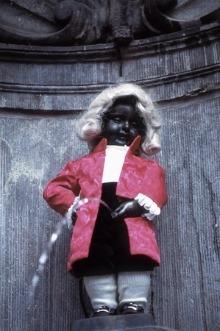 My new book MOZART’S LAST ARIA will be out in the UK in May. Naturally this means a revamp for my website (coming soon) and a new promo video (coming about the same time) to be posted to Youtube. You know, all the stuff writers actually get into the business of writing in order to do. That, and cashing the massive cheques, of course. Oh, and the groupies who throw their panties at you at book-store readings. And the drugs.
My new book MOZART’S LAST ARIA will be out in the UK in May. Naturally this means a revamp for my website (coming soon) and a new promo video (coming about the same time) to be posted to Youtube. You know, all the stuff writers actually get into the business of writing in order to do. That, and cashing the massive cheques, of course. Oh, and the groupies who throw their panties at you at book-store readings. And the drugs.Anyhow, that’s enough digression, even for a blog post. So back to the point: All my previous video clips – which can be viewed on my website – have necessitated no more than a jaunt to Nablus, Gaza or Bethlehem, where I’ve been filmed chatting about the latest adventures of my Palestinian sleuth Omar Yussef. This time, I have to recreate the world of Vienna, 1791, for my historical mystery.
For the novel, creating the atmosphere, the details and the locations of Vienna during Mozart’s time brought me to amass a few shelf-loads of research, to learn piano so I could play some Mozart, and to travel in Austria and Central Europe.
The video places a few more demands. This week I’ve been getting into costume.
I found a theatrical costume shop on a tiny alley in the oldest part of West Jerusalem just off Jaffa Road. Run by a delightful, bustling French lady named Francoise Coriat, the compact store is packed up and down (hanging from the ceiling too) with pirate suits, musketeer costumes, and every other period-wear you’d ever need. Mostly Francoise hires them out to theaters.
She kitted me out with two big flouncy dresses for the two female musicians who’ll feature in the video and three frock-coat suits for the men. And a Little Mozart costume for my three year old son.
Then it was time to figure out exactly how to film it. My videographer pal David Blumenfeld produces new equipment each year when it’s time for me to get a video done. This time he has a little slide to mount on top of his tripod; put the camera (these things are so small these days) on it and you can make a dolly shot that looks positively cinematic. His lighting is increasingly creative too. So I was sure it’d look great.
I worked up a script last week, aiming to make the video seem more like a movie trailer than the more documentary/journalistic style of most of my previous promos. Why? Well, first because MOZART’S LAST ARIA isn’t based on a topic you’re used to seeing featured in the news – whereas Palestinians, unfortunately for them, are very much in the news. Morever, it seems to me people are used to reading novels which are like movies – almost entirely visual, very little of the internal narrative of novels written a century ago – so perhaps book promotional videos ought to be that way too. This is how we think of stories these days.
True, said my friend Matthew Kalman, a journalist based here in Jerusalem who’s also a filmmaker. But beware, he said, that you don’t expect amateur actors to…act.
Read the rest of this post on my blog The Man of Twists and Turns.
Published on December 30, 2010 02:03
•
Tags:
austria, bethlehem, book-promos, book-videos, crime-fiction, gaza, historical-fiction, jerusalem, mozart, mozart-s-last-aria, my-books, nablus, omar-yussef, palestine, palestinians, videos, youtube-com
December 25, 2010
Bethlehem upbeat for Christmas
 For the first time in years, the people of Bethlehem have something more to celebrate at Christmas than the recollection of an important birth in their town 2,000 years ago.
For the first time in years, the people of Bethlehem have something more to celebrate at Christmas than the recollection of an important birth in their town 2,000 years ago.After the city’s economy was devastated by the Palestinian intifada over the last decade, Bethlehem’s economic recovery has picked up pace in the last year with gross domestic product rising by 9 percent. This Christmas the city’s streets are packed with tourists and pilgrims, and if the holy family were to arrive today they would, once more, discover that there’s no room at the inn — Bethlehem’s hotels are filled to capacity.
Locals see this as an important marker on their road back to normality. “Tourists are coming. Things are all right in Bethlehem,” said Walid Zawahra, a taxi driver.
Zawahra stood beside his yellow Mercedes cab, watching tourists pour through the massive gate in Israel’s security wall around Bethlehem. The gate is opened only once a year, for Christmas, so that the Roman Catholic Patriarch can enter in procession with his entourage from Jerusalem. The rest of the year, visitors must pass through a smaller entrance at the nearby checkpoint.
Security remains a factor, however. The streets beyond the gate were closed to traffic. Palestinian security forces were out in force on the roads around Rachel’s Tomb, which Jews believe to be the site of the burial of the biblical matriarch and where Israeli soldiers still stand guard. The tomb, which has taken on the dimensions of a fortress in the last decade, is a frequent point of friction between the soldiers and Palestinian rioters, and the authorities don’t want Christmas marred by any violence.
The Church of the Nativity, which stands over the site of Jesus’s birth, opened Friday after a 24-hour security closure, as police swept it for bombs before the Patriarch’s arrival for Midnight Mass.
In Manger Square, outside the church, two new cafes have been doing a bumper business, hosting local families and tourists late into the night. A stage built against the buttresses of the Armenian monastery at the front of the church hosted live musical performances in the evening.
The Bethlehem area also has something novel to entertain its young people — namely, something to do after dark. Until recently, youngsters in Bethlehem complained that their city shut down at twilight. Two night clubs opened in the last few months in the largely Christian district of Beit Jala. One of them is named Taboo, because it serves pork and, therefore, contravenes the proscriptions of Islam by which most West Bank restaurants operate.
Read the rest of this post on my blog The Man of Twists and Turns.
Published on December 25, 2010 01:45
•
Tags:
arabs, beit-jala, bethlehem, christians, christmas, global-post, intifada, jesus, journalism, manger-square, middle-east, nativity-church, palestine, palestinians, rachel-s-tomb, roman-catholic, west-bank



